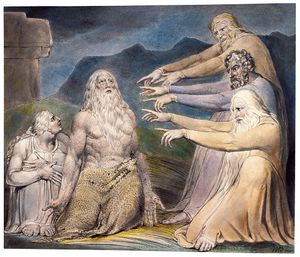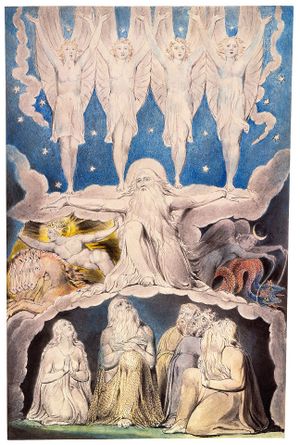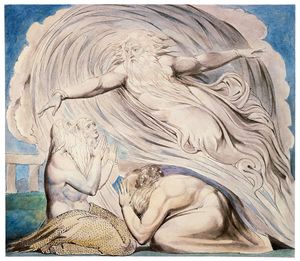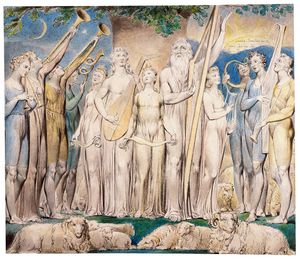Sermon for February 25th, 2024
Job 12:1-12
1 Then Job answered: 2 “No doubt you are the people, and wisdom will die with you. 3 But I have understanding as well as you; I am not inferior to you. Who does not know such things as these? 4 I am a laughingstock to my friends; I, who called upon God and he answered me, a just and blameless man, I am a laughingstock. 5 Those at ease have contempt for misfortune, but it is ready for those whose feet are unstable. 6 The tents of robbers are at peace, and those who provoke God are secure, who bring their god in their hands.
7 “But ask the animals, and they will teach you, the birds of the air, and they will tell you; 8 ask the plants of the earth, and they will teach you, and the fish of the sea will declare to you. 9 Who among all these does not know that the hand of the Lord has done this? 10 In his hand is the life of every living thing and the breath of every human being.
In Pursuit of Wisdom (Part I)
A man was driving in the countryside one day when his car broke down near a monastery. He went to the monastery, and the monks graciously offered to help him. They invited him to stay the night while they repaired his car. The man gratefully accepted their offer. That night, wandering the halls of the monastery, he observed a large wooden door with a golden plaque on it which read: Behind this door lies the secret of all true wisdom. The next morning, he asked the monks about the door, and they all grew quiet. But the man was persistent, and asked them what was behind the door. Finally one monk responded, "We can't tell you. You're not a monk." The man's curiosity was piqued, but he went on his way. Years later, he returned to the monastery and asked again about the door, and the secret of all true wisdom. The monks still refused to tell him unless he became a monk. He was so curious that he decided to join the monastery. After many years of hard work and meditation, he finally became a monk. They led him to the door, and with great anticipation he opened it. And know what he saw? I can't tell you… because you're not a monk.
For those of you who are not familiar with the Book of Job, it’s about a man named Job who loses almost everything—his house, his income, his children, and his health. Job cries out to God in his suffering, and he argues with his three friends, who seem to think that God is punishing him for something he’s done. In the end God appears to Job and restores to him everything he has lost and more. Through the years, many people have interpreted the Book of Job as a story about patience in the face of suffering, and how God—in the end—will come through for your in your times of trouble. But that’s just a surface level read, which focuses entirely on the first two chapters and the last two chapters. The Book of Job is 42 chapters long, and at its core it’s really a story about the pursuit of wisdom. Along with the Book of Proverbs and the Book of Ecclesiastes, Job is part of what biblical scholars refer to as “wisdom literature” in the Bible. And not unlike the joke I just told you about the monastery door, the “secret of all true wisdom” in the book of Job takes years of study, meditation, and commitment to really begin to approach.
That’s one of the reasons why I’ve preached on the Book of Job during the season of Lent every year for the past 11 years. Sometimes we’ve focused on the story, other times we’ve focused on one or more characters. We’ve looked at the themes of grief and tragedy, and why bad things happen to good people. But this year, for the next three weeks, I want to really hone in on the core message of the book: What is wisdom (according to God), and how do we pursue it in our lives, our vocations, and in our relationships with others?
So let’s dive right in…
Today’s scripture reading picks up in chapter 12, after Job’s three friends have arrived to comfort him in the wake of his loss, with all the popular psychology, platitudes, and philosophies of their time. But Job isn’t buying it…after they’ve each weighed in, and Job has listened patiently to all they have to say, he tears into them with this great, sarcastic, and not-so patient opening line in verse 2: No doubt you are the people, and wisdom will die with you. (I love this book!).
Then Job quickly pivots, appealing to their shared humanity: “I have understanding as well as you; I am not inferior to you. Who does not know such things as these?” Job’s three friends are a little bit like the monks in the monastery—they seem to believe that wisdom is locked behind a special door, that only certain people with certain credentials can have access to it. But as we’ll see in a little while, Job takes a more egalitarian approach: You don’t need a PhD or a license or specialized knowledge to be wise—in fact, these things can often be a distraction. We’re sometimes guilty of this, too: If a doctor says it, or if “science” says it (whatever that means), or if a pastor says it… it must be right. It must be good for us. Doctors, Scientists and Pastors (among others) may have specialized knowledge, but their credentials don’t guarantee wise application of that knowledge. That part is up to you.
Next, Job points out some pretty big contradictions in the philosophies of his friends: I’ve been a just and blameless man, and yet here I am now, a laughingstock to you. Robbers are at peace in their homes, and those who provoke God (presumably with ungodly lifestyles) are doing just fine. How do you square those things in your philosophy, in your religion?
And the hard truth is, you can’t. No religion, no philosophy, and certainly no science has ever been able to give a good answer to the question of why bad things happen to good people. Many have tried, but all fall short. You either wind up with a weak and ineffective God, who could help us in our misfortunes, but doesn’t out of some kind of restrained respect for our “free will” (and even that explanation doesn’t account for accidents and natural disasters that afflict us). Or you can take God out of the equation entirely, and believe that bad things happen randomly and inexplicably to good people and good things happen just as randomly and inexplicably to bad people, and there is no justice in the universe. For what it’s worth, “science” has affirmed in many studies that this kind of belief system (or lack thereof) tends to produce anxiety, despair, and unhappy lives. Who would want to live in a world with no hope?
Ah…but now we’ve gone down the same rabbit hole as Job’s three friends. The Book of Job is not about philosophy, religious belief, or acceptable answers to difficult questions. It’s about wisdom, how we approach life, and how we respond to the things that happen to us…good, bad, or anything in between.
So how do we do that? Where do we start? I love Job’s answer. I love it so much I have it framed and hanging on the wall in my office. He says, beginning in verse 7: “Ask the animals, and they will teach you, the birds of the air, and they will tell you; ask the plants of the earth, and they will teach you, and the fish of the sea will declare to you.
In other words, start simple. Be still for a minute, and observe the world around you. Make it a habit to spend time in God’s creation—the plants and the animals and the birds and the fish all have something valuable to teach us. Have you ever heard of a fish on anti-depressants because it’s concerned about the state of world affairs? Me neither.
In verse 9, Job says “Who among all these does not know that the hand of the Lord has done this?” Some have interpreted that to mean that all the plants and animals know that God is responsible “this” or, all the bad things that have happened to Job. But the word translated in your Bibles as “this” is a pesky little word in Hebrew: זֹּֽאת (zot). Strong’s concordance says it can mean, “hereby, in it, likewise, the one other, same, she, such deed, or so much. I really like that last option better: “Who among all these (God’s creations) does not know that the hand of the Lord has done…so much? All of God’s creatures declare this with their very existence!
Job concludes in verse 10: In his hand (and this is key! In God’s hand, not yours, not mine, not the government’s, not the culture’s or society’s but in God’s hand) is the life of every living thing and the breath of every human being.
Clearly, we have a lot more ground to cover in our pursuit of wisdom and our study of the Book of Job, and we’ll finish this chapter next week. But for now, as a humble beginning to your wisdom journeys, remember these two things:
First: Start simple. Whatever problem or decision you’re facing, whatever situation you’re going through that calls for true wisdom, take some time to immerse yourself in the wonder and beauty of God’s creation. Take a walk. Grab a cup of coffee and sit outside on your porch. Plant something and watch it grow. Let God speak to you through the things he made for you.
Second: Put your trust and your hope in a God who loves you, a God who holds the life of every living thing in his capable hands. We spend a lot of time trying to figure out exactly how that works, and sometimes our questions can be useful, but sometimes they just leave us spinning our wheels and getting nowhere. True wisdom begins with recognizing when to let go and simply trust in God. Your life may be long, short, terrible or terrific, but in the end, your life belongs to God, who gave you your first breath, your last breath, and every breath in between…as a gift.
Now, take a deep breath. Let it out. Thank you, God. May your divine wisdom fill our lives just as the air that fills our lungs.



